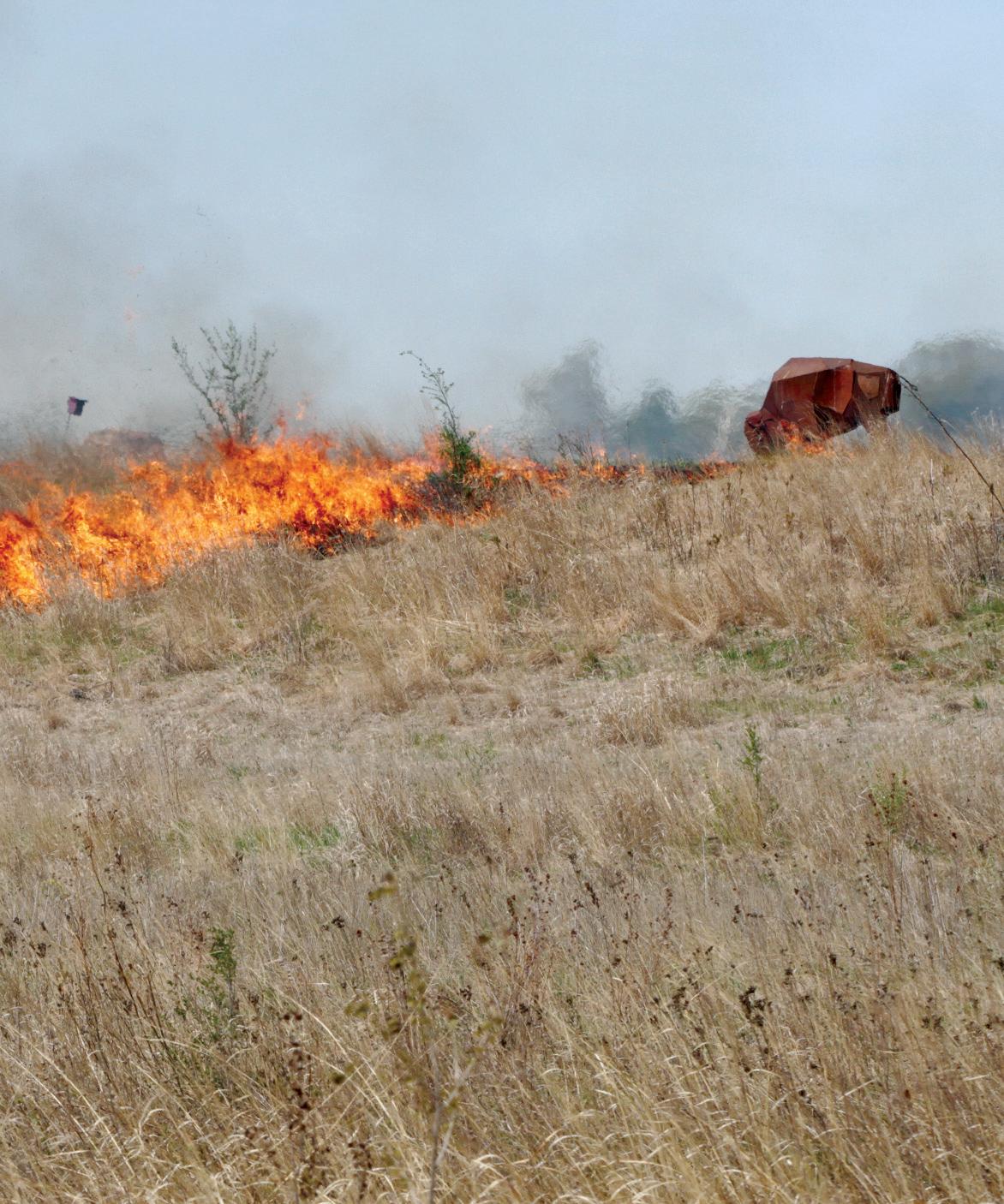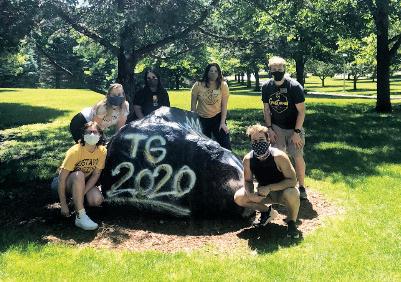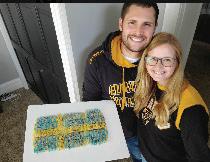
14 minute read
TRAIL BLAZED

Trail Blazed Despite appearances, the metal bison sculpture Tatanka, 2019, created by Gustavus art students and located in the Coneflower Prairie, does not breathe fire. This is the beginning of May’s controlled burn, a small, slow backfire culminating in a large, fast, head fire that swept quickly across the prairie. It was scheduled (the last one was four years ago) to manage the habitat and vegetation in this prairie. The habitat depends on fire to remove invasive woody trees, shrubs, and other plant species. The prairie’s true self has since reemerged from the ashes. She is as ready as she can be for a new semester.
Advertisement
Välkommen
THE GREAT CHALLENGES OF OUR TIME.
It will come as no surprise that the last six months have been among the most challenging in the College’s history. Each day presents new obstacles, prompting new decisions to be made. And yet, every day, we move forward. Despite the toll the pandemic has made on all of us, despite the impact George Floyd’s murder has taken on all of us, despite the daily uncertainty of the economy, we move forward. Here’s what I know: Our students, faculty, and staff want to move forward in their intellectual, spiritual, and social journeys. Our Board of Trustees wants our college to be financially strong. All of us want an equitable culture that affirms that Black lives matter on our campus and everywhere else. With my background as a biomedical engineer, I have always practiced evidencebased decision-making. So has Heather Dale, the director of the Gustavus Health Service (see page 8). She says, “We don’t have all the evidence, so we have to be flexible and nimble and willing to admit that some things need to change.” That’s a challenge, Gusties. That’s also the power of the liberal arts—the ability to take in data from a variety of sources, explore it from multiple perspectives, and make the best possible decisions. Then we evaluate, adjust, and move forward again, together. Our strategic plan calls on us to act on the great challenges of our time. The two significant challenges Gustavus currently faces—systemic racism and the pandemic— both require all of us to work together, to do the right thing, and to adjust our behaviors as we go forward for the wellbeing of all. At the end of each day, I am grateful. Walking alongside me through these difficult times are critical thinkers, problem solvers, tireless seekers of justice, and committed Gustie professionals who work to ensure the safety and success of our students. As we begin the academic year—likely one for the history books—I hold onto our vision statement. We may not fully solve the great challenges of our time, but with all the knowledge we have before us, and all the elements that are within our control, we will act.


Rebecca M. Bergman President, Gustavus Adolphus College
GUSTAVUS ADOLPHUS COLLEGE BOARD OF TRUSTEES
The Rev. Jon V. Anderson (ex officio), Bishop, Southwestern Minnesota Synod, ELCA Scott P. Anderson ’89, MBA (chair), Senior Advisor, TPG Capital Tracy L. Bahl ’84, MBA, President and Chief Executive Officer, OneOncology Grayce Belvedere-Young, MBA, Founder and CEO, Lily Pad Consulting The Rev. Kevin D. Bergeson ’02 (ex officio), Senior Pastor, Trinity Lutheran Church and Schools; President, Gustavus Adolphus College Association of Congregations Rebecca M. Bergman (ex officio), President, Gustavus Adolphus College Suzanne F. Boda ’82, Former Senior Vice President, Los Angeles, American Airlines Robert D. Brown, Jr. ’83, MA, MD, Staff Neurologist, Professor of Neurology, Mayo Clinic College of Medicine, and John T. and Lillian Matthews Professor of Neuroscience, Mayo Clinic Kara K. Buckner ’97, Managing Director/Chief Strategy Officer, Fallon Worldwide Janette F. Concepcion, PhD, Clinical Psychologist, Concepcion Psychological Services Edward J. Drenttel ’81, JD, Attorney/Partner, Winthrop & Weinstine Bruce A. Edwards ’77, Retired CEO, DHL Global Supply Chain James H. Gale ’83, MA, JD, Attorney at Law John O. Hallberg ’79, MBA, Retired CEO, Children’s Cancer Research Fund
Susie B. Heim ’83, Former Co-owner, S and S Heim Construction
Mary Dee J. Hicks ’75, PhD, Retired Senior Vice President, Personnel Decisions International
The Rev. Peter C. Johnson ’92, Executive Pastor, St. Andrew Lutheran Church
Paul R. Koch ’87, Managing Director–Private Wealth Advisor, Senior Portfolio Manager, Koch Wealth Solutions, RBC Wealth Management Dennis A. Lind ’72, Chairman, Midwest Bank Group, Inc. Jan Lindman, MBA, Treasurer to the King, The Royal Court of Sweden The Rev. Dr. David J. Lose, Senior Pastor, Mount Olivet Lutheran Church
Gordon D. Mansergh ’84, MA, MEd, PhD, Senior Behavioral Scientist, Centers for Disease Control and Prevention (serving in a personal capacity) and Past President, Gustavus Alumni Association
Mikka S. McCracken ’09, Executive Director for Innovation/Director, ELCA Leader Lab, Evangelical Lutheran Church in America
Jan Ledin Michaletz ’74, Past President, Gustavus Alumni Association
Thomas J. Mielke ’80, JD, Retired Senior Vice President and General Counsel, Kimberly-Clark Corporation Bradley S. Nuss ’97, Executive Vice President and Chief Financial Officer, Nuss Truck & Equipment Marcia L. Page ’82, MBA, Founding Partner, Värde Partners
The Rev. Dr. Dan. S. Poffenberger ’82, Senior Pastor, Shepherd of the Lake Lutheran Church Karl D. Self ’81, MBA, DDS, Associate Professor, University of Minnesota School of Dentistry Ronald C. White ’75, President, RC White Enterprises The Rev. Heather Teune Wigdahl ’95, Senior Pastor, Our Savior’s Lutheran Church
ON THE HILL
ACTIVE ROOMS
The Gustavus pandemic response as represented in the number of Google Hangout Chats.

0 Dec 22 Jan 9 Jan 27 Feb 14 Mar 3 Mar 21 Apr 8 Apr 26 May 14 Jun 1 Jun 19
Hangouts Chat 1-day created rooms Hangouts Chat 7-day created rooms Hangouts Chat 30-day created rooms
ACTIVE USERS

0 Dec 22 Jan 9 Jan 27 Feb 14 Mar 3 Mar 21 Apr 8 Apr 26 May 14 Jun 1 Jun 19
Hangouts Chat 1-day active users Hangouts Chat 7-day active users Hangouts Chat 30-day active users
VIRTUAL CONNECTIONS, VIRTUALLY PERFECT
When the College announced its transition to online course delivery this spring, faculty and staff scrambled to reimagine what the rest of the semester might look like. As soon as the announcement went out, questions started rolling in: Could staff take their monitors home? How could they log into systems that only run on the oncampus network? Would keycards still work to access buildings?
Behind the scenes, Gustavus Technology Services (GTS) staff jumped into action. They set up processes for virtual meetings and classes, helped professors move materials to the College’s online course management system, and implemented a laptop loan program for faculty and staff who typically work from a desktop computer on campus. The Web Services team quickly created the College’s COVID-19 webpage with daily updates and frequently asked questions. Technology Services personnel worked with faculty and staff to ensure access to systems and data while working from home—and that employees could use digital materials while following good data security practices.
“For the last several months, our work has been about access—making sure people have the tools and resources they need,” Chief Technology Officer Tami Aune ’82 said.
What did that look like? Twenty virtual training sessions for faculty had 375 total attendees. Eight more staff sessions were joined by 175 employees. More than 18,000 Google Meets were created by Gustavus accounts—everything from class sessions and department meetings to longdistance happy hours and the first-ever virtual meeting of the Board of Trustees.
Next up: Fall semester, which features a mix of face-to-face, hybrid, and online courses—and the possibility that the College will go virtual again at the drop of a hat. Whatever happens, GTS will be ready.
PRETTY GOOD NEWS
Sarah Mersch ’21 received the ThinkSwiss Research Award funded by the Embassy of Switzerland in Washington, D.C. The scholarship promotes and funds research opportunities in Switzerland for American students with the intent of fostering exchanges between universities and research institutions. Mersch is a junior chemistry and
Sarah Mersch
environmental studies major, whose previous research (with chemistry professor Jeff Jeremiason) traced metals and Pb isotopes in an African Crater Lake.
Gustavus Adolphus College launched a new podcast hosted by history professor Greg Kaster. Learning for Life @ Gustavus features Kaster interviewing campus experts, alumni, and others to explore the intersections of liberal arts learning, current events, and
Greg Kaster
problem solving from the Gustavus campus. The first season (10 episodes) is available on nearly all platforms including Apple Podcasts, Spotify, Google Podcasts, and RadioPublic. Transcripts of each episode will be available online at gustavus.edu/news.
Rebecca Fremo
English professor Rebecca Fremo
was named the 2020 winner of the Swenson-Bunn Memorial Award for Teaching Excellence at the College’s virtual Honors Day Convocation in May. Nominated and selected by students, the award honors the memory of two Gustavus students and members of the Student Senate, Greg Swenson ’91 and Holly Bunn ’92, who died in a car accident in 1989.
Two alumni made a $2.65 million gift to support the College’s Counseling Center. Mark
Terri DeGiusti Henneman and Mark Henneman
Henneman and Terri DeGiusti Henneman, both members of the Class of 1983, will help fund current staffing and establish an endowment to ensure future services to students.
To minimize the risk and spread of COVID-19, the College adjusted its fall semester schedule. Most first-years will begin on campus with online classes except for their FTS or CUR-100 course. At press time, sophomores, juniors, and seniors will return to campus beginning Sept. 25, at which point courses will transition to in-person, online, or a hybrid. After Thanksgiving, the College will transition back to online course delivery for the last week of classes and final exams, concluding on December 15.
NOBEL CONFERENCE 56, NOW ONLINE
The 2020 Nobel Conference will be delivered in an online format. It will still take place October 6 and 7, with its signature mix of expert lectures, discussions, and audience questions live. In addition, beginning in September, the conference will release videos and interactive activities specifically created for our online format and available for access at any time. The topic remains as it was before the pandemic: Cancer in the Age of Biotechnology.

The 2020 conference will be offered online at no charge. Current ticket holders will be offered a full refund. Register to watch online at gustavus.edu/nobel.
CAMPUS SOCIAL
@gustavusadolphuscollege @gustieathletics INSTAGRAM
@gustiestudentlife Either IKEA was having the world’s worst yard sale or our awesome Physical Plant staff was recently taking some of the (really) old built-in dressers out of Complex....

@gustavusadolphuscollege Quiet summer days on the hill. #whygustavus
Follow /gustavusadolphuscollege
FACEBOOK TWITTER

@gustavusalumni Bake-Off Finalists Jennessa Runia-Bade ’15 and
Leif Runia-Bade ’14
With their traditionally themed Swedish Kringle. Beautifully decorated with Gustavian roots in mind.
Follow /gustavusathletics /gustavusfinearts /gustavusalumni @gustavusadm Our summer tour guides took their artistic abilities outside on a beautiful morning to paint the rock in front of Old Main! Come check out the rock and all the other beautiful parts of campus by scheduling a visit today at https://gustavus.edu/admission/visit/. #whygustavus
@gustavusadolphuscollege “We need a nest, and vastness. We need safety, and risk.”—Minnesota storyteller Kevin Kling ’79 to #Gusties20 grads. #whygustavus.
Follow @gustavus, @gustiealum
10:00 a.m. Time for Reflection

—Michael Osterholm, director of the Center for Infectious Disease Research and Policy at the University of Minnesota and a current leading voice during COVID-19 pandemic, speaking 14 years ago about the consequences of a global pandemic at the 2006 Nobel Conference
SHINE : HEATHER DALE, PA-C
Behind Our COVID-19 Response THE DIRECTOR OF HEALTH SERVICE AND ASSISTANT DEAN OF STUDENTS REMINDS US TO CONTROL WHAT WE CAN CONTROL.

“I think of the Serenity Prayer,” Dale says. “‘God, grant me the serenity to accept the things I cannot change, courage to change the things I can, and wisdom to know the difference.’ That is what spring was about.”
When the threat of COVID-19 reached Minnesota, Dale was among the first people College leadership turned to for help in making decisions. As chair of the Infectious Disease
Committee and the director of Health Service, Dale was the clinical expert in the room, guiding the health decisions and processes necessary to keep students and staff safe. This summer, it’s been all about making plans for fall. There are things Gustavus can control…somewhat, Dale says. “We are preparing campus with protocols to mitigate the spread of infection. Classrooms, offices and the dining hall will follow public health guidelines,” But—and it’s a big but—“residence halls and after-hours time will be our greatest challenge to control.” Consider your own Gustavus years; it’s unlikely “social distancing” was a priority. So how do you create a social environment for the pandemicera college student? At press time, 12 action teams made up of more than 125 Gusties are working on it, including at least one student on each team. Faculty, staff and students have been educated about COVID-19 and asked to take the Gustie ROAR pledge: Respect Others, Act Responsibly. “It has absolutely been a team of warriors,” Dale says. That’s no surprise to her. For more than a decade, Dale has worked across campus divisions and college life to keep Gustavus healthy, including six years as a head resident in Sohre and Sorensen. If the spring and summer were about the Serenity Prayer, what will the fall be about? “We will make mistakes along the way,” Dale says, “because ultimately this is a huge scientific experiment. Science is all about making hypotheses and testing them, and most of the time they fail. But we must persist with new ideas and creative solutions.”
Gustavus will test Gusties with COVID symptoms, as well as those who have been in close contact with someone who has tested
positive. To do so, Health Service staff must wear the personal protective equipment Dale is sporting here. Contact tracing, isolation and quarantine are other important actions to minimize spread. The College has set aside housing for students and their contacts who test positive.
COMMUNITY
SHINE : CONRAD ODDOYE ’20
The Surprising Grace of the Pandemic A LAST-MINUTE COLLEGIATE TRACK CAREER, A MUSICAL SCORE TO FINISH, AND THEN THERE WAS COVID.
Basketball got him to Gustavus from Alberta, Canada. But always there was music, which Oddoye had been playing since he was seven and composing since he was ten. “I was producing music in my room in Co-Ed,” he says, and soon it was all he could think about. Sophomore year he stepped away from the court to play in several bands, including the cleverly named Bandated Reporters, so called because three of the members were Gustavus mandated reporters.
But the thought of singing live at a gig and failing miserably terrified him. Finally, he went to the Gustavus Counseling Center, where his counselor named it: performance anxiety. Oddoye had an “aha” moment. “That was a huge part of my basketball career—being awesome in practice, then hands shaking, legs feeling like Jello in games, worried about letting a team down.” He sang at that gig, and it’s been easier ever since.
One day, track & field assistant coach Nathan Harder, admiring Oddoye’s height, invited him to try the high jump and discus. Oddoye didn’t like it. “Then I saw the sprinters,” he says. “That looked fun.” Plus, he didn’t experience as much performance anxiety—he wasn’t a top sprinter, so not much hinged on his success. And every single week of practice he was earning a personal best. He ran one collegiate 200-meter race before he was off to Spain for a semester. He was about to run another race and begin rehearsals for the spring musical when COVID hit.
Talk about anxiety. “I was extremely stressed out,” he says. “When you don’t know where you’re going to live in two weeks, it’s hard to focus on the assignment that’s due on Wednesday.” He ended up as one of the 70 or so students—mostly international students—approved to stay on campus through the spring semester. He then stayed through the summer, waiting for his visa so he can work in the U.S. and pursue graduate school in counseling psychology. When life opens up fully, he’ll play live shows again. Until then, he’s pretty zen, spending the summer making music in his on-campus apartment, walking a professor’s dog, and not being too hard on himself. “I feel like everyone deserves grace,” he says, “especially during a time like this.”

EXCELLENCE Oddoye was .75 credits short to graduate when he signed on to
compose the music for the production of Mother Courage. He worked from the existing libretto and led the cast in recording their parts from home, thanks to the pandemic. “It’s very difficult to collaborate across distance,” Oddoye says. “But I was able to make it really easy for people to listen and hear how it should sound.” He also produced the album. For more on the show, see page 23.



